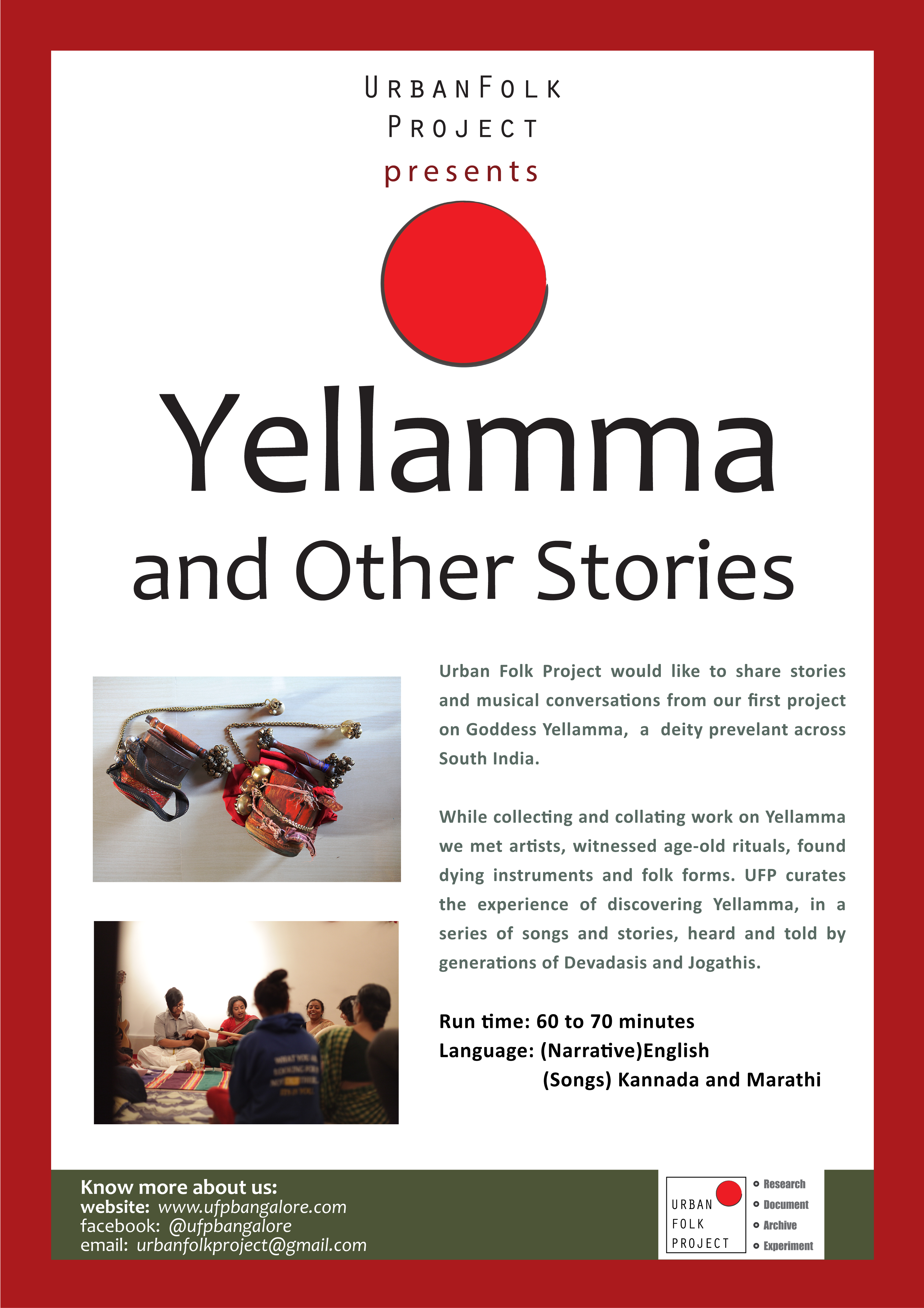«Prev From Sep 13, '25 to Oct 13, '25 Next»

5328
Yellamma and other stories
Fri Aug 17, 7:00 PM
Shruti Rao
Urban Folk Project is an initiative to build bodies of work that introduces folk arts to an urban audience. The project was started by Shilpa Mudbi Kothakota and Adithya Kothakota to bring to the fore lesser known folk forms by creating scope for research, documentation, archiving and ultimately experimenting with these knowledge systems. In order fuse more folk into our lives we stepped out into lesser known semi-urban and rural territories of Karnataka and met inspiring people and experienced practitioners across the state assuring us a lifetime of work that led us to creating UFP.
We started our journey with ‘Yellammanaata’ which is a ritualistic overnight play hosted mostly during Dussera by marginal communities around North Karnataka. It is the telling of the transformation of a princess named Renuka into the powerful Goddess Yellamma. Yellamma’s temples are across South India, even in Sri Lanka. Her following across Karnataka, and Maharashtra consists of the Jogathi (transgender women disciples), Jogamma, Jogappa and the devadasi communities. We followed these communities to document rare and dying forms related to ‘Yellammanaata’ like ‘Chowdki Pada’ and ‘Jogathi Nritya’. Along the journey we have met some spectacular artists and eye-opening concepts. Today’s performance is a collection of our experiences, the myth of Yellamma, the songs we learnt from our first folk mentors and some of the folk forms that the ‘Yellamma’ following harbours.
We believe the contemporary world has a lot to draw from cultures that are deeply rooted to the land and people. When we took a closer look at the ways in which language was used, rituals were constructed and songs were composed in folk performances, we observed how structures of social hierarchy present themselves. Once stripped of its artifice, roles ascribed by society become blurred. We see our work contributing to the encouragement of pluralistic thinking in learners. History textbooks speak of broad sweep ‘mainstream’ historical narratives. It is increasingly important, in contemporary times, to engage with history as multifaceted and culture as heterogeneous. Our attempt is to initiate perhaps a simpler way to ensure that people hear of forms that were born in a different environment.
UFP asks, how can we, as aware and educated public help establish a stronger connection with the ‘other’? Is the ‘other’ indeed different from ‘us’? Why and how?
We started our journey with ‘Yellammanaata’ which is a ritualistic overnight play hosted mostly during Dussera by marginal communities around North Karnataka. It is the telling of the transformation of a princess named Renuka into the powerful Goddess Yellamma. Yellamma’s temples are across South India, even in Sri Lanka. Her following across Karnataka, and Maharashtra consists of the Jogathi (transgender women disciples), Jogamma, Jogappa and the devadasi communities. We followed these communities to document rare and dying forms related to ‘Yellammanaata’ like ‘Chowdki Pada’ and ‘Jogathi Nritya’. Along the journey we have met some spectacular artists and eye-opening concepts. Today’s performance is a collection of our experiences, the myth of Yellamma, the songs we learnt from our first folk mentors and some of the folk forms that the ‘Yellamma’ following harbours.
We believe the contemporary world has a lot to draw from cultures that are deeply rooted to the land and people. When we took a closer look at the ways in which language was used, rituals were constructed and songs were composed in folk performances, we observed how structures of social hierarchy present themselves. Once stripped of its artifice, roles ascribed by society become blurred. We see our work contributing to the encouragement of pluralistic thinking in learners. History textbooks speak of broad sweep ‘mainstream’ historical narratives. It is increasingly important, in contemporary times, to engage with history as multifaceted and culture as heterogeneous. Our attempt is to initiate perhaps a simpler way to ensure that people hear of forms that were born in a different environment.
UFP asks, how can we, as aware and educated public help establish a stronger connection with the ‘other’? Is the ‘other’ indeed different from ‘us’? Why and how?

